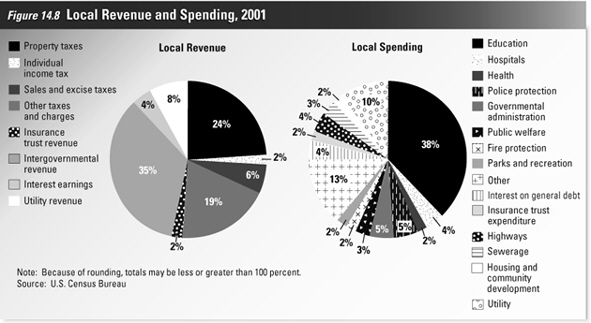Matching
|
|
|
Identifying Key Terms
Match each term with the correct
statement below. a. | corporate income tax | g. | incidence of a
tax | b. | estate tax | h. | deductions | c. | regressive tax | i. | real property | d. | proportional
tax | j. | Medicaid | e. | individual income tax | k. | withholding | f. | gift
tax | l. | Social
Security |
|
|
|
1.
|
a tax on the total value of the money and property of a person who has
died
|
|
|
2.
|
a tax for which the percentage of income paid in taxes remains the same for all
income levels
|
|
|
3.
|
a tax on the amount of money a person earns
|
|
|
4.
|
a tax for which the percentage of income paid in taxes decreases as income
increases
|
|
|
5.
|
a tax on the value of a company’s profits
|
|
|
6.
|
taking tax payments out of an employee’s pay before he or she receives
it
|
|
|
7.
|
variable amounts that you can subtract from your gross income
|
|
|
8.
|
the final burden of a tax
|
|
|
9.
|
entitlement program that benefits low-income families, some people with
disabilities, and elderly people in nursing homes
|
|
|
10.
|
physical possessions, such as land and buildings
|
Multiple Choice
Identify the
choice that best completes the statement or answers the question.
|
|
|
11.
|
What do taxes collected under the Federal Insurance Contribution Act (FICA)
fund?
a. | Social Security and Medicaid | b. | Social Security and
Medicare | c. | Medicare and Medicaid | d. | Medicaid and Supplemental Security
Income |
|
|
|
12.
|
Which of the following defines a means-tested program?
a. | Eligibility depends on income. | b. | Any person who is a U.S. citizen is
eligible. | c. | Age is a major criterion for eligibility. | d. | People pay first and
receive benefits later. |
|
|
|
13.
|
Who generally bears most of a sales tax when the demand for the good taxed is
inelastic?
a. | the retailer | c. | the wholesaler | b. | the consumer | d. | the producer |
|
|
|
14.
|
What do Social Security taxes pay for?
a. | benefits to federal workers and military personnel | b. | benefits to those
who are unemployed | c. | transportation and training expenses for
low-income people | d. | benefits to older citizens, surviving family
members of wage earners, and people with certain disabilities |
|
|
|
15.
|
Which of the following is one reason the federal government collects income
taxes as a person earns?
a. | so that people do not realize exactly how much they are paying | b. | so that the money
can be put aside until it is needed | c. | so that the government can pay bills as they
come due | d. | so that taxpayers can qualify for refunds of excess
tax |
|
|
|
16.
|
What is a major difference between an operating budget and a capital
budget?
a. | In an operating budget, legislation is needed; in a capital budget, no legislation is
needed. | b. | An operating budget is raised by bonds; a capital budget is raised by
taxes. | c. | An operating budget consists of small amounts of money; a capital budget consists of
large amounts of money. | d. | An operating budget is for day-to-day expenses;
a capital budget is for investment spending. |
|
|
|
17.
|
What is an entitlement?
a. | a social welfare program providing benefits to people who meet certain eligibility
requirements | b. | a social welfare program paying bills for government spending such as supplies and
utilities | c. | a social welfare program spending funds over which legislators have direct
control | d. | a social welfare program providing payments that the government receives for certain
services |
|
|
|
18.
|
What is the major source of tax revenue for local governments?
a. | inheritance taxes | c. | property taxes | b. | income taxes | d. | sales taxes |
|
Short Answer
|
|
|
Reading a Chart

|
|
|
19.
|
What percentage of local revenue comes from property taxes?
|
|
|
20.
|
What is the largest category of local spending?
|
|
|
21.
|
What percentage of local spending is on police protection?
|
Essay
|
|
|
Critical Thinking
|
|
|
22.
|
Expressing Problems Clearly What does it mean that the federal income tax
is a progressive tax?
|
|
|
23.
|
Recognizing Ideologies Explain the four characteristics of a good
tax.
|
|
|
24.
|
Making Comparisons What is a balanced budget, and why is it so much
easier to balance state budgets than the federal budget?
|